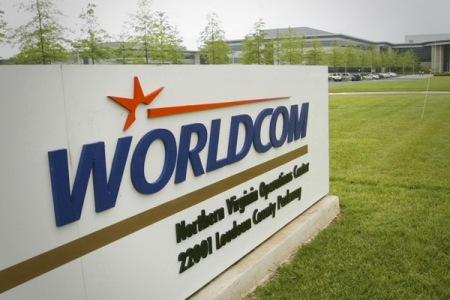In 1983 at a coffee shop in Hattiesburg, Mississippi Mr.Ebbers created the business concept that become WorldCom. WorldCom achieved its position as significant player in the telecommunications industry through 65 acquisitions. Two of these acquisition were important.
- The MFS communication acquisition (Enable WorldCom to obtain UUNet)
- In 1998 acquiring telecommunication firm MCI.
The telephone company “WorldCom” become the second-largest telephone company in the United States and one of the largest companies handling worldwide Internet data traffic, through the execution of an aggressive acquisition strategy.

In June 1999 with WorldCom’s shares trading at the rate of $64, WorldCom was darling the new Economy.
In May 2002 Ebber resigned as the CEO of this large company. Two months later WorldCom declared itself, the largest bankruptcy in American history.
Major reasons for bankruptcy;
- The aggressive corporate strategy of growth through acquisition.
- The use of loans to senior executives.
- The threats to corporate governance.
- WorldCom’s efforts in integrating with MCI, illustrated several areas in which senior management did not do well, their customer services did not work out well.
- In WorldCom’s Financial reporting, they’ve used a liberal interpretation of accounting rules when preparing the financial statements. They have manipulated the reports to show an increasing growth in profits. WorldCom written down one million dollars’ worth assets which they have acquired. They have capitalized their expanses. As a result bigger losses looked smaller in the statements. This profit picture showed that WorldCom’s growth rate was higher the industry growth rate.
- When Arthur Andersen audited these financial accounts they have not given any adverse opinion since they have developed a long term relationship with the company.
 Impact of this bankruptcy;
Impact of this bankruptcy;
- The MCI was left with only 55,000 employees, resulting in a downfall in their productivity to $88,000 from its peak.
- 300,000 telecommunication workers lost their jobs.
- Telecommunication equipment manufacturers for WorldCom, who benefited initially, suffered in the end with layoffs and depreciated share prices.
Two years later in December 2005, the telecommunications industry consolidated further. “Verizon” Communications acquired MCI/WorldCom and “SBC” Communications acquired AT&T Corporation, which had been in business since the 19th Century.

-WMC Madubhashani-